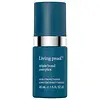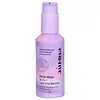What's inside
What's inside
 Key Ingredients
Key Ingredients

No key ingredients
 Benefits
Benefits

 Concerns
Concerns

 Ingredients Side-by-side
Ingredients Side-by-side

Water
Skin ConditioningCetyl Alcohol
EmollientGlyceryl Stearate
EmollientIsodecyl Oleate
EmollientIsopentyldiol
HumectantDioctyldodecyl Dodecanedioate
EmollientSodium Phytate
Phytosteryl/Octyldodecyl Lauroyl Glutamate
Skin ConditioningOlea Europaea Leaf Extract
PerfumingHelianthus Annuus Seed Wax
Skin ConditioningJojoba Esters
EmollientLinoleamidopropyl Dimethylamine Dimer Dilinoleate
Skin ConditioningC10-18 Triglycerides
EmollientRicinus Communis Seed Oil
MaskingGlyceryl Ricinoleate
EmollientCyclodextrin
AbsorbentPropanediol
SolventGlycerin
HumectantPentylene Glycol
Skin ConditioningCeteth-20
CleansingSteareth-20
CleansingPEG-75 Stearate
Polyglycerin-3
HumectantHydroxypropyl Methylcellulose
Emulsion StabilisingCyamopsis Tetragonoloba Gum
Emulsion StabilisingHydroxyethylcellulose
Emulsion StabilisingXanthan Gum
EmulsifyingCaesalpinia Spinosa Gum
Skin ConditioningParfum
MaskingCitric Acid
BufferingSodium Hydroxide
BufferingGluconic Acid
Hydroxyacetophenone
AntioxidantSodium Benzoate
MaskingLinalool
PerfumingHexyl Cinnamal
PerfumingCitronellol
PerfumingCitral
PerfumingLimonene
PerfumingWater, Cetyl Alcohol, Glyceryl Stearate, Isodecyl Oleate, Isopentyldiol, Dioctyldodecyl Dodecanedioate, Sodium Phytate, Phytosteryl/Octyldodecyl Lauroyl Glutamate, Olea Europaea Leaf Extract, Helianthus Annuus Seed Wax, Jojoba Esters, Linoleamidopropyl Dimethylamine Dimer Dilinoleate, C10-18 Triglycerides, Ricinus Communis Seed Oil, Glyceryl Ricinoleate, Cyclodextrin, Propanediol, Glycerin, Pentylene Glycol, Ceteth-20, Steareth-20, PEG-75 Stearate, Polyglycerin-3, Hydroxypropyl Methylcellulose, Cyamopsis Tetragonoloba Gum, Hydroxyethylcellulose, Xanthan Gum, Caesalpinia Spinosa Gum, Parfum, Citric Acid, Sodium Hydroxide, Gluconic Acid, Hydroxyacetophenone, Sodium Benzoate, Linalool, Hexyl Cinnamal, Citronellol, Citral, Limonene
Water
Skin ConditioningHydrolyzed Soy Protein
HumectantStearyl Alcohol
EmollientBehentrimonium Methosulfate
Cetearyl Alcohol
EmollientCetyl Alcohol
EmollientArgania Spinosa Kernel Oil
EmollientHydrolyzed Vegetable Protein
Skin ConditioningAdansonia Digitata Seed Oil
EmollientPrunus Amygdalus Dulcis Oil
Skin ConditioningCocos Nucifera Oil
MaskingRicinus Communis Seed Oil
MaskingAloe Barbadensis Leaf Juice
Skin ConditioningPanthenol
Skin ConditioningHydrogenated Castor Oil/Sebacic Acid Copolymer
EmollientPolyquaternium-6
Hydroxypropyl Guar
Emulsion StabilisingGuar Hydroxypropyltrimonium Chloride
Skin ConditioningDimethicone
EmollientBenzoic Acid
MaskingDehydroacetic Acid
PreservativePhenoxyethanol
PreservativeParfum
MaskingWater, Hydrolyzed Soy Protein, Stearyl Alcohol, Behentrimonium Methosulfate, Cetearyl Alcohol, Cetyl Alcohol, Argania Spinosa Kernel Oil, Hydrolyzed Vegetable Protein, Adansonia Digitata Seed Oil, Prunus Amygdalus Dulcis Oil, Cocos Nucifera Oil, Ricinus Communis Seed Oil, Aloe Barbadensis Leaf Juice, Panthenol, Hydrogenated Castor Oil/Sebacic Acid Copolymer, Polyquaternium-6, Hydroxypropyl Guar, Guar Hydroxypropyltrimonium Chloride, Dimethicone, Benzoic Acid, Dehydroacetic Acid, Phenoxyethanol, Parfum
Alternatives
Ingredients Explained
These ingredients are found in both products.
Ingredients higher up in an ingredient list are typically present in a larger amount.
Cetyl Alcohol is a fatty alcohol. Fatty Alcohols are most often used as an emollient or to thicken a product.
Its main roles are:
Though it has "alcohol" in the name, it is not related to denatured alcohol or ethyl alcohol.
The FDA allows products labeled "alcohol-free" to have fatty alcohols.
Learn more about Cetyl AlcoholParfum is a catch-all term for an ingredient or more that is used to give a scent to products.
Also called "fragrance", this ingredient can be a blend of hundreds of chemicals or plant oils. This means every product with "fragrance" or "parfum" in the ingredients list is a different mixture.
For instance, Habanolide is a proprietary trade name for a specific aroma chemical. When used as a fragrance ingredient in cosmetics, most aroma chemicals fall under the broad labeling category of “FRAGRANCE” or “PARFUM” according to EU and US regulations.
The term 'parfum' or 'fragrance' is not regulated in many countries. In many cases, it is up to the brand to define this term.
For instance, many brands choose to label themselves as "fragrance-free" because they are not using synthetic fragrances. However, their products may still contain ingredients such as essential oils that are considered a fragrance by INCI standards.
One example is Calendula flower extract. Calendula is an essential oil that still imparts a scent or 'fragrance'.
Depending on the blend, the ingredients in the mixture can cause allergies and sensitivities on the skin. Some ingredients that are known EU allergens include linalool and citronellol.
Parfum can also be used to mask or cover an unpleasant scent.
The bottom line is: not all fragrances/parfum/ingredients are created equally. If you are worried about fragrances, we recommend taking a closer look at an ingredient. And of course, we always recommend speaking with a professional.
Learn more about ParfumRicinus Communis Seed Oil is the INCI name for castor oil.
Castor Oil helps moisturize the skin. It is rich in a fatty acid called ricinoleic acid. This fatty acid helps prevent moisture loss on the skin. This helps keep your skin soft and hydrated. Ricinoleic acid also has anti-inflammatory and pain reducing properties.
Besides hydrating the skin, castor oil is also used to hydrate hair. By keeping the hair shaft moisturized, breakage is decreased. More studies are needed to show castor oil's effective on stimulating hair growth.
Castor oil is created by cold-pressing castor seeds and then purifying the oil with heat. It was used in Ancient Egypt as fuel in lamps and to help treat eye irritation.
The term 'fragrance' is not regulated in many countries. In many cases, it is up to the brand to define this term. For instance, many brands choose to label themselves as "fragrance-free" because they are not using synthetic fragrances. However, their products may still contain ingredients such as essential oils that are considered a fragrance.
Learn more about Ricinus Communis Seed OilWater. It's the most common cosmetic ingredient of all. You'll usually see it at the top of ingredient lists, meaning that it makes up the largest part of the product.
So why is it so popular? Water most often acts as a solvent - this means that it helps dissolve other ingredients into the formulation.
You'll also recognize water as that liquid we all need to stay alive. If you see this, drink a glass of water. Stay hydrated!
Learn more about Water